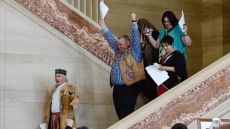OTTAWA — Stephen Poloz talks like a man who's had a weight lifted off his shoulders.
Eight years after the financial crisis, the Bank of Canada governor believes much of the pressure that pushed the world toward a second Great Depression remains present — and that central banks need help to ease it.
Help — like increased spending, a Trudeau government hallmark that Poloz happens to believe is necessary to help policy-makers like himself grapple with the negative effects of the still-fragile global economy, he told The Canadian Press in an interview.
Poloz presented an improved 2016 growth projection earlier this week, thanks to the new federal government's commitment to flood the economy with cash with measures such as infrastructure projects and tax relief for middle-income earners.
Without it, he said, Wednesday's forecast would have been lower.
"We are in a setting where I think a different mix of policies would be more favourable for the world," Poloz said at the bank's offices in Ottawa, shortly after the bank presented its fresh economic outlook.
"We're fortunate in Canada that was have that fiscal capability right now to actually shift our mix that way, as the government has done ... This is exactly the setting where fiscal policy is its most effective and it's also where monetary policy is its least effective."
Poloz will be in Washington for the next few days for meetings with the International Monetary Fund, the World Bank and his fellow G20 central bankers. Finance Minister Bill Morneau is already there.
Morneau, like Prime Minister Justin Trudeau, has used international stages in recent months to repeat the Liberal mantra that governments should revive their struggling economies through investment even if it means adding to the public debt.
On Thursday, the Wall Street Journal called Morneau the "poster child" for the IMF's push to persuade the world's biggest economies to increase government spending — or at least reconsider any plans to cut back — as a means of helping the global economy.
"It's helpful for the global economy even if just Canada does it, although our impact is not huge because of the size of our economy in the context of the global economy," Morneau said Thursday in Washington.
"And if others follow us, it's amplified."
The Liberal spending measures were part of a federal budget that projected five straight annual deficits totalling more than $110 billion, beginning with a shortfall of $29.4 billion in 2016-17.
This new approach has been a stark shift from that of the former Conservative government, which sought to curb spending in an effort to balance the books.
Under the Conservatives, the Bank of Canada wielded its primary monetary policy tool when it dropped its benchmark interest rate in 2015 — twice. The moves were intended to help cushion the economy from the impact of a commodity-price crash that began in late 2014.
On Wednesday, the bank left its key rate unchanged at 0.5 per cent. Poloz said the bank might have considered yet another cut had it not been for the fiscal measures rolled into last month's Liberal budget.
The world has learned a lot about monetary policy tools since the 2008 financial crisis, Poloz said. To lift economies, central banks have even leaned on unconventional measures, such as negative interest rates and quantitative easing.
While such tools have had effects, their impacts have not necessarily been large or predictable, and have dented financial stability, he added. By contrast, Poloz believes the power of fiscal stimulus is more significant, dollar for dollar, and more predictable in today's context.
"But it is a question of fiscal capacity or room and a lot of countries don't have it," Poloz said, referring to Canada's strong borrowing position. "We happen to have it."
The world economy, meanwhile, remains uncertain.
Asked what keeps him awake at night, Poloz pointed to the volatility in the first two months of 2016 as an example. He said the depth of China's slowdown weighs on his mind, as does the state of the U.S. and the global economy.
"The world continues to have plenty of capacity to disappoint us," he said. "The list is as long as your arm."
Poloz recalled that back in 2008, central banks and fiscal authorities worked together to prevent what could well have turned out to be the second Great Depression. Eight years have passed, but "the things that were pushing us down in that post-crisis setting — they're largely still there."
"And that's why really low interest rates look like they're not having as big of an effect as you might expect," Poloz said.
"It's that we're pushing something up a hill. So, you can't stop pushing, otherwise the thing's going to roll back down."




